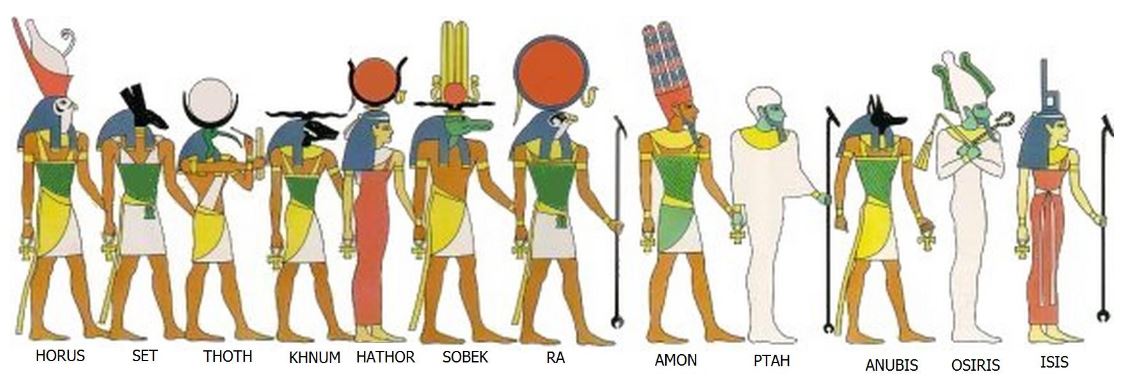
12 December 2020
The Gods of the Egyptians or Studies in Egyptian Mythology by E.A. Wallis Budge.
Egyptologists had not thoroughly realised the distinction which exists between the primitive or predynastic element in the Egyptian religion and the Asiatic element. This element was of a solar character undoubtedly, and was introduced into Egypt by the ” Followers of Horus,” or the “Blacksmiths,” who invaded the country, and conquered the natives, and settling down there, built up the great dynastic civilisation which we call Egyptian. This seems to be the correct explanation of the diversity of view of two such eminent experts, and the opposite character of their conclusions appears to be due chiefly to the difference of the standpoints from which they viewed the subject.
The number of the gods, even under the IVth Dynasty, about B.c. 3600, was very great, and as time went on it multiplied greatly. The Pyramid Texts, which were written under the IVth, Vth and VIth Dynasties, supply the names of about two hundred gods and mythological beings, but in the Book of the Dead according to the Theban Recension (B.c. 1700-1200) over five hundred gods are mentioned.
The materialistic heaven of Osiris appealed to the masses in Egypt, to the heaven where Ra lived and onto the priests of Ra, along with other solar gods passing onto to royal and aristocratic families, and also to the members of the foreign section of the community who were of Eastern origin.
Kings and priests from time to time made attempts to absorb the cult of Osiris into religious systems of a solar character, but they failed, and Osiris, the man-god, always triumphed, and at the last, when his cult disappeared before the religion of the Man Christ, the Egyptians who embraced Christianity found that the moral system of the old cult and that of the new religion were so similar, and the promises of resurrection and immortality in each so much alike, that they transferred their allegiance from Osiris to Jesus of Nazareth without difficulty. Moreover, Isis and the child Horus were straightway identified with Mary the Virgin and her son, and in the apocryphal literature of the first few centuries which followed the evangelisation of Egypt, several of the legends about Isis and her sorrowful wanderings were made to centre round the Mother of Christ. Certain of the attributes of the sister goddesses of Isis were also ascribed to her, and, like the goddess Neith of Sais, she was declared to possess perpetual virginity. Certain of the Egyptian Christian Fathers gave to the Virgin the title “Theo-tokos,” or “Mother of God,” forgetting, apparently, that it was an exact translation of neter mut, a very old and common title of Isis.
The great gods of Egypt have been grouped as far as possible, and they are discussed in connection with the various religious centres to which they belong, e.g., Ptah, Sekhet, and I-em-hetep with Memphis, Amen, Mut, and Khensu with Thebes, and the ” Great Company ” of the gods with Heliopolis.
wallis budge
Further Study
What Is The Obsession With Ancient Egypt By The Priesthood? Seeking The Reptile
The Story Of The Nations, The Story Of Ancient Egypt
The Book Of Enoch Translated By R.H. Charles (1917)
In Profile : The Essenes Of Qumran
The Last Druid : Ben McBrady Of The Old Gaelic Order
Books